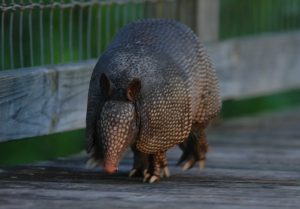It is very common to find your yard being dug up throughout the year in our area due to the nine-banded armadillo. This non-native mammal is searching through your yard, looking for insects and grubs as it creates its triangular shaped divots. You may even be unlikely enough to have one of their round burrows on your property.

This then brings up the question… What do you do with an armadillo?
The simplest possible answer I usually give is to hire a wildlife control professional because they are licensed to capture and remove nuisance wildlife from your yard. To find a listing of wildlife control professionals, visit https://app.myfwc.com/hgm/nwt/nwtsearch.aspx .
Attempting to trap an armadillo yourself can be an issue because:
- They can injure you and can possibly carry leprosy.
- They do not readily go to baits so trapping is difficult.
- Once trapped you can only either euthanize or release the animal on the same contiguous property or on private property that is over 40 acres in size with permission of the landowner.
Due to these issues, you should definitely consider utilizing a professional or armadillos or the majority of nuisance wildlife issues.
As for prevention, commercially available wildlife deterrents have not been proven effecting and do not use homemade pesticides or products as they are not intended per their label. A major example of this is never use mothballs in the landscape. It is also not usually effective to try to kill out all insects from your garden that they may feed on. You may consider putting fencing around areas you do not want armadillos to enter but it must be buried deep enough that they cannot burrow under.
Also, do not try to poison armadillos and make sure that you are not accidentally destroying a burrow of a gopher tortoise (These will be more domed shape with a flat bottom compared to the armadillo).
If you have questions about armadillos or other wildlife, reach out to your local UF/IFAS Extension office.
Source: UF/IFAS Pest Alert
Note: All images and contents are the property of UF/IFAS.



